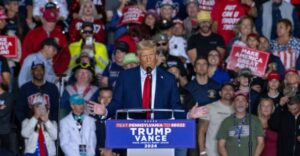It seems that some officials in Brussels are nostalgic for Donald Trump, viewing his potential re-election to the White House as a “bitter pill” that could nevertheless drive changes within the European bloc, especially in defense matters.
Referring to a “dirty little secret,” Politico, in its European edition, reports that some European officials believe a Trump victory might provide the impetus the EU needs to bolster its defense and adopt a tougher stance on China.
“Trump’s return would be a beneficial shock allowing the EU to move forward on issues like the pandemic or the post-Ukraine war energy crisis,” commented a senior EU diplomat, speaking anonymously. This perspective, shared confidentially by several EU diplomats and officials, does not stem from an affinity for the Republican candidate or his policies.
A “Bitter Pill” for a Divided EU
Even so, a second Trump term could serve as a “bitter pill” that a divided EU might need to overcome its divisions and advance as a united bloc, six EU diplomats and officials told Politico.
According to the officials, a Trump presidency would be hostile to Europe, pushing the European bloc toward increased defense spending, technological investment, and policy clarity on China. However, they also recall painful experiences from Trump’s first term, when he insulted leaders, called Brussels a “hellhole,” and launched a trade war against the bloc.
Officially, EU officials and leaders typically avoid commenting on foreign elections. When they do, they limit themselves to saying Europe must prepare for either a Trump or Kamala Harris victory. Privately, however, they analyze how a leadership change in Washington could drive policy changes within Europe.
Key Issues
According to officials, a Trump victory could have significant impacts on a range of issues, from Ukraine to defense and the economy. These changes could be positive.
The most obvious area where a Trump presidency could influence Europe is defense and the war in Ukraine. The former president has repeatedly accused Europe of benefiting from free American military protection through NATO and has even allegedly threatened to withdraw Washington from the alliance altogether.
Regarding Russia’s war in Ukraine, Trump has claimed he would end the conflict the day after his re-election, apparently without Kyiv’s consent. Should he return to the White House, a Trump administration could increase pressure on Europe concerning “burden-sharing” beyond anything seen since NATO’s founding in 1949.
“We Need a Real Shock”
“Trump raises awareness about defense funding, but we need a real shock to change this discussion,” an EU official stated. “An agreement on a peace plan for Ukraine would shake things up entirely.”
An EU diplomat added: “In this atmosphere, where we sometimes seem on the brink of World War III, Trump appears more averse to wars.”
One example is funding weapons for Ukraine. Currently, a group of EU countries wants to jointly borrow funds through the issuance of Eurobonds to increase available funding for Kyiv. This move faces resistance, however, from the so-called “frugal” countries, such as Germany and the Netherlands.
Defense Eurobonds
Those pushing for the issuance of Eurobonds for defense hope that a second Trump term might mobilize these countries, as the pandemic did, to accept joint borrowing.
In contrast, a Harris victory “would give further ammunition to those opposed to the idea by suggesting that joint borrowing is dead,” an EU diplomat remarked.
Economy
Similar reasoning applies to Europe’s sluggish economy, which has struggled for years to harmonize its single market.
In a landmark report published last month, former European Central Bank head Mario Draghi warned that Europe risks economic decline. Draghi argued that the EU should unify its markets and invest heavily in industrial capacity.
However, reforms to harmonize the EU market, especially its financial sector, have never progressed far, despite a decade of consultations.
Officials believe another Trump term could act as a catalyst, forcing reluctant countries to finally accept joint oversight of their banks and stock exchanges.
At the same time, Trump’s return could also drive the bloc toward a more protective trade approach. Last year, amid concerns about Trump’s possible return, Brussels and Washington attempted to resolve their steel and aluminum tariff dispute, yet reached no agreement, as both sides were distracted by the Israel-Hamas war.
Brussels has committed to postponing retaliatory tariffs until March 2025, just two months after the next U.S. president’s inauguration. The EU hopes to avoid an all-out trade war with the U.S. but is better prepared to retaliate against Washington this time if necessary.
Meanwhile, Europe, the U.S., and other governments are struggling to safeguard their global climate strategy against a potential rollback under Trump.
Taking Destiny into Their Own Hands
Officials say that Brussels is better prepared this time around. European leaders, unlike the surprises of 2016, feel more aware of what may come and are preparing for the impacts.
A Trump victory would also play a key role in Europe’s relations with China. During Trump’s term, several European countries faced pressure and ultimately abandoned contracts with Chinese telecom giant Huawei amid cybersecurity concerns raised by the U.S.
Germany, in particular, has avoided confrontation with China over Huawei out of fear Beijing might retaliate against its automotive industry. The country agreed to exclude Huawei from its networks this year but has delayed implementation longer than expected.
While the Biden administration has taken a conciliatory approach toward the EU’s relationship with China, a Trump administration could change this approach.
Ursula von der Leyen “clearly wants a tougher approach to China, but faces resistance from hesitant member states, mainly Germany,” said a senior EU official. “A little push from another Trump administration would help her rather than hurt her.”
Preparing for a Shift in EU-U.S. Relations Regardless of Outcome
As the November 5 election approaches, European officials are unlikely to express these views publicly. Trump is deeply unpopular across much of Europe, and embracing him would not score points.
Nonetheless, officials have indicated that it may be time to embrace autonomy, suggesting that Europe should prepare for a significant shift in EU-U.S. relations, regardless of the election outcome.
Ask me anything
Explore related questions





